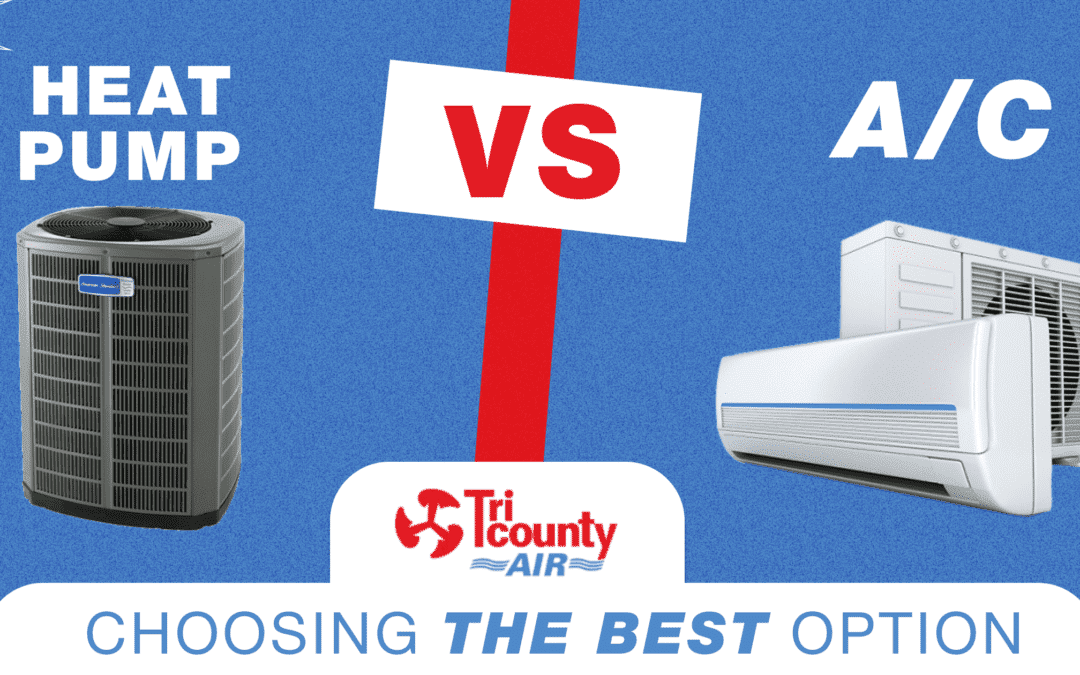A homeowner facing HVAC replacement can often choose between a heat pump and a new central air conditioning system. We’ll explain what each does and the factors to consider when deciding to install a heat pump or A/C. Knowing how they compare can help you make the most informed decision possible.
How Does a Central A/C Work?
An air conditioner’s primary function is to draw in hot air from inside your home. This air then passes over the evaporator coil while the refrigerant inside absorbs heat. The refrigerant then continues through the lines, is pressurized by the compressor, and heat is released at the condenser coil into the surrounding air.
Air is cooled and then pumped back into rooms via ducts and registers. But an A/C only provides cooling and does so by transferring heat to the outside air. To heat a home, you need to have a furnace installed that kicks in when you switch the thermostat to heating mode.
How Does a Heat Pump Work?
A heat pump provides cooling in a similar way that a central A/C does. It uses refrigerant as well, which is moved through the system by a compressor. However, it includes other components such as a thermostatic expansion valve to regulate refrigerant flow based on cooling or heating demand, and a reversing valve to change the flow of refrigerant.
A heat pump provides heat by moving it from the outside air (an air source heat pump) or underground (a geothermal heat pump) to inside your home. As long as it is above 30℉ outside, an air source unit can heat a home to at least 70℉. Many heat pumps have a supplemental electric heating element for when the temperature is colder than usual.
How They Compare
Both central A/Cs and heat pumps are extremely reliable, depending on where they are installed. The following considerations will help compare them and determine the best option for your home:
- Efficiency: A heat pump is more energy efficient than an air conditioner. While energy usage increases when the electric heater turns on, heat pumps typically use five times less energy and ENERGY STAR® rated models use even less. By comparison, an air conditioner averages about 3,000 watts of energy consumption per hour (and that’s by running about 15 minutes twice in that time).
- Durability: Both heat pumps and A/Cs have lifespans that can vary depending on the climate and how well they’re maintained. Air conditioners usually last 15 to 20 years. A heat pump can last 15 years. However, it tends to last around 10 years in a coastal climate but may last for 20 to 25 years in a moderate climate.
- Cost: Air conditioners range from $3,000 to $7,000. There are many types to consider while a unit’s size and the need for electrical updates, ductwork, and other services can increase the cost. Heat pumps range from $1,500 to $10,000, as the price can vary considerably depending on the type of heat pump and the size of your home.1
Heat pumps and air conditioners look very similar to one another. They also require regular maintenance. You should schedule maintenance for a heat pump once a year, or twice annually if it’s used all year long. Air conditioners should be inspected in the spring and fall to ensure they will run during times of peak demand.
Speak to an HVAC Installation Professional
A heat pump will use more energy in colder temperatures. Air conditioners run seasonally but this depends on climate. They last slightly longer in most circumstances and are less costly. In Florida, homeowners rely on their ACs for much of the year. Fortunately, they can depend on Tri County Air for A/C services, including repair, maintenance, and installation/replacement. If you have further questions about choosing between a heat pump vs. A/C, or wish to schedule service, request an appointment online or call (941) 485-2222.

